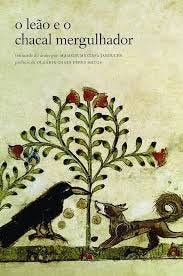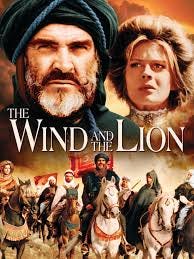Rabbits, Lions, and Tempests: Fables of Geopolitics
The Israelis were, with words and symbols, inviting Iranians opposed to the Islamic regime to also rise against their government and collaborate with Israel in the objective of regime change.
I like lions! From a safe distance, of course. To observe them up close, bars would be necessary... and a caged lion isn't quite the lion I like. One can get close, very close, in photos and films, but something is certainly lost... one gets the aesthetic framing but doesn't have access to the rawness and strength of a lion present in nature... In any case, I like lions.

Maybe it's partly astrological (yes, I am occasionally accused of harboring magical thinking... but you needn't worry: I don't try to pass them on or sell them to anyone...). Being a Leo myself, it seems only appropriate that I should like the one said to be the "king of animals," associated with the sun and the qualities of nobility and honor.
I also like fables, proverbs, parables. Perhaps this could be explained as a personal preference, accidental, like any other preference... But I like to think there must be something deeper: the Arab tradition of storytelling; a small family lineage of good tale-tellers and collectors of fables and proverbs; perhaps even roots planted in a region of the world where exemplary stories came to inhabit the sacred texts of monotheism. Anyway, I like fables..., and they're full of lions.
And I like words; I like, as was also the case with the Diving Jackal, a character from the book "The Lion and the Diving Jackal1," 'to dive into the subtle meanings' of words; and I like what is done with words.
For all these reasons, when I learned that Israel had named its military operation, its attack against Iran, as "The Rising Lion," I felt I needed to investigate...
Before anything else, it must be said that, obviously, the name wasn't given in Portuguese, and when I say 'Rising Lion,' I'm seeking the best translation for what I saw, in English, as 'Rising Lion' and, in Arabic, as 'Al Assad Al Sa'ed.' As soon as I arrived at the Portuguese formula, I felt it didn't carry the same force as the other two; the "ascendente" doesn't evoke in the same way a lion that rises, that stands up, like one preparing for attack...
I discovered later that, in Hebrew, the name given was 'Am KeLavi,' which could be better translated as 'A nation like a lion,' and which would convey the idea of a nation that rises like a lion. It wouldn't be strange if the Israelis had chosen a name with sound and meaning more appropriate for the domestic audience, and another more clearly understood by the rest of the world.
But what did they mean by those words and that name?
I discovered it's a direct reference to the biblical text that, in Numbers 23:24, says something like 'Behold, the people (or the nation) rises like a lioness and lifts itself up like a lion.' The people, or the nation, is that of Israelites from the Old Testament. The choice of name tries to tell us that today's Israel fulfills the prophecy and the promise contained in the Bible and rises against enemies with the certainty of divine victory.
So far, nothing too strange. Although, yes, a discussion would be warranted about the insistence of a country that insists on calling itself democratic, liberal, diverse, open, in recognizing itself in symbols that speak of the exclusivism of the privilege of the Israelites of the Old Testament, a privilege that today's Israel would have inherited through genetic lineage alone... Note that the operation currently underway against Gaza also intends to carry biblical symbolism: 'Gideon's Chariots' is the name that combines the word for Israeli tanks (merkava) and the biblical character who supposedly defeated the Midianites...
But one soon discovers that the Israelis themselves chose the name 'Rising Lion' having in mind a second meaning other than the biblical one or that specifically directed at the Israeli public. The name also wanted to reference the lion that previously occupied the center of Iran's flag in the Shah's time, that is, before the Islamic Revolution, and behind which emerged or ascended a sun. The Israelis were, with words and symbols, inviting Iranians opposed to the Islamic regime (who in the Israeli, American, and Western imagination constitute the vast majority of the population) to also rise against their government and collaborate with Israel in the objective of regime change.
They proposed to the Iranians that they abandon the symbol that today appears on the national flag, a stylized 'Allah' in Arabic and Persian script, the symbol of the Islamic character of the Revolution and the political system now in force, and return to the lion, as an ancient Persian and monarchical symbol of power, combined with the sun, identified as Mitra, a deity from the pre-Zoroastrian era. They proposed that they should want to return to the times of the Pahlavi dynasty, which claimed to be more than a thousand years old, and that they should want to elevate to the condition of Shah a puppet of the Americans and Israelis, son of the one who had previously been a puppet and who was overthrown by the Revolution.
It doesn't seem to have worked very well...
Inevitably, while thinking about the operation's name and its meanings, its purposes, while thinking about this text and also while following the events of the twelve days that have already passed since the Israeli operation lasted, complemented at the end with American attacks against Iran, other images and stories with lions occurred to me. About two of them, I have already spoken and written on other occasions; because they are especially relevant here, I write again (after all, has anyone ever imagined what would become of fables, proverbs, and parables if they were only told once?!).
The first is an anecdote that doesn't have the grandeur of classical and more ancient fables, but which is successful in academic circles: it tells of a rabbit that has a thesis, that rabbits are the true predators of foxes and wolves; when it encounters a fox that is about to attack it, devouring it, it asks her to pause to hear its thesis; as she shows herself skeptical, it invites her to go with him to a burrow where she will be noisily torn apart and from which the rabbit emerges unharmed; when it encounters a wolf also about to devour it, it presents the same thesis and repeats the invitation; the wolf is also torn apart and the rabbit remains unharmed. It is then discovered that in the burrow was the lion to whom the rabbit led foxes and wolves to be destroyed and devoured. In academic circles, the nature of the message was easily understood: you can defend whatever thesis you want, however absurd it may be, as long as you have an advisor with sufficient power.
I have already used the image to represent the relationship between Israel and the United States. Israel, for a long time, seems to be able to do everything in the international arena, in its relationship with Palestinians and other peoples of the Middle East, in its interaction with international organizations and with international law itself, in its relationship even with American society by having secured for itself the unconditional support of the governments and institutions of the most powerful state in the world.
Regarding the attacks against Iran that Israel decided to call Rising Lion, the parallel with the story of the rabbit and the lion is even more perfect: not having managed to single-handedly defeat Iran or lead it to regime change, Israel literally had to resort to the military power of its patron so that it would directly attack the adversary.
It didn't work; sometimes, foxes and wolves escape with their lives...
And, precisely, the second parable I want to refer to here, once again, helps explain why the Israeli thesis didn't work this time, despite the support it received from its usual patron.
Up to this point, the lion appeared as the symbol of power or as the character that embodies the greatest potency. In this new parable, the opposite occurs somewhat, though not entirely.
The image I refer to is found in an invented letter, which is read at the final part of a film inspired by real events, but which takes important liberties in relation to reality. The film's name, 'The Wind and the Lion,' derives from the opposition established in the letter. The writer is Raisuli, an Arab from the desert, and the addressee is Roosevelt, the President of the United States. Raisuli says:
You are like the wind and I like the lion. You form the tempest. The sand burns my eyes and the ground is parched. I defy you with my roar but you do not hear. But between us there is a difference. I, like the lion, must stay in my place. While you, like the wind, will never know yours.
One can clearly perceive the lion's lesser power compared to the wind capable of sowing tempests and dragging everything along with it. The wind doesn't care about the lion's roar and temporarily blinds it, while making its path of destruction.
However, the lion's lesser power also has its limitation: as long as the wind doesn't stop being merely a tempest and doesn't come to replace the lion in the relationship it maintains with the earth, the lion will not be defeated. The wind's power has its reverse in the fact that it doesn't know its place.
Well, Iran is somewhat like the lion; it knows its place and must stay there. But it is more, because it is the place itself, the very earth, the very sand and the very ground that the wind stirs up. Nothing can remove it from there. The same can be said of the Palestinians, as they heroically resist having their roots torn from their land.
Israel, on the other hand, is part of the wind, part of the tempest that the wind has been feeding in the Middle East for decades. However much it seeks to ground itself in biblical narrative, and even in the real history of a relationship between Jews and historical Palestine, for the legitimacy of Israel's presence in the region, it is clear that this project of segregation, ethnic cleansing, genocide, colonization does not belong to the land and does not have a genuine relationship with it. The tempest can last and can destroy, but it cannot remain. It too shall pass.
Book published in Brazil by Mamede Jarouche







